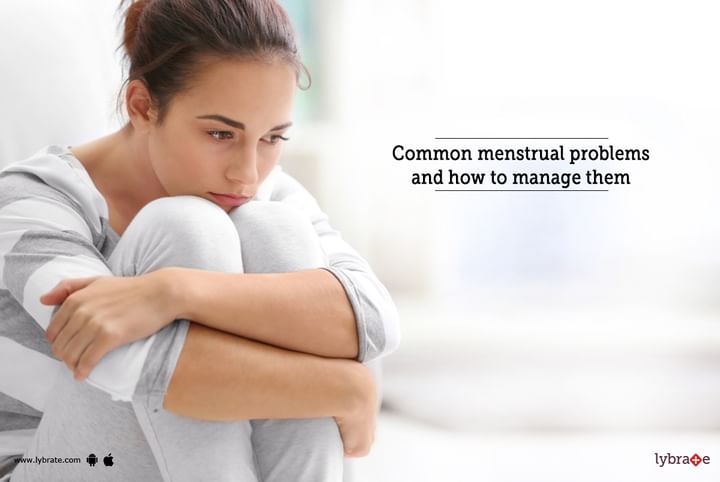Get the App
For Doctors
Login/Sign-up
Last Updated: Mar 14, 2023
BookMark
Report
Common menstrual problems and how to manage them
Dr. Preeti YadavGynaecologist • 16 Years Exp.MBBS, MS - Obstetrics & Gynaecology, Diploma In Minimal Access Surgery
What are menstrual problems?
Menstrual problems are any kind of issues or irregularities a woman may experience with her monthly period. These can range from a heavier than usual menstrual flow to an extreme amount of pain or cramping during this time. Other problems related to menstruation include problems of getting pregnant, irregular menstruation, premenstrual syndrome and endometriosis.
How can I manage common menstrual problems?
There are many ways in which to manage common menstrual problems. Here are some tips:
- Exercise regularly – Exercise has been shown to help regulate hormones, reduce stress and improve mood, all things that may improve your overall health and make your periods more bearable. You should not complicate exercise; brisk walking or swimming are great options that won't break the bank.
- Learn what foods to avoid – Certain foods can trigger inflammation and worsen PMS such as red meat, processed meats and sugary foods like candy bars or sodas; you should aim for whole grain cereal, fruits/vegetables and fish for meals more likely to reduce your symptoms associated with menstruation.
- Take pain relief medications - For cramps or aches related to menstruation over-the-counter medications (such as ibuprofen) can be very helpful in alleviating some discomfort associated with the condition; it’s also important however not to overuse these medications since they may deplete body stores of essential vitamins and minerals if taken for too long of a period of time.
- Try alternative therapies – If you’re looking for more natural methods of relief there is still hope! Acupuncture has been known to alleviate severe menstrual cramping in some people; yoga poses such as child’s pose or cat/cow stretches have also been known ease period cramps along with guided visualization which relies on progressive relaxation techniques using mental images that bring a sense of peace or ease while meditating on various points within the body releasing tension stored throughout different muscles groups related to breath work).
- Talk openly about menstruation– Talking openly about menstruation is the first step towards understanding it better and learning how to handle it better so don’t feel embarrassed talking about it! Every women experiences it differently so connect with other women who understand what you’re going through in regards to PMS issues—talking is therapeutic!
Types of menstrual problems
- Abnormal uterine bleeding (AUB): AUB is a term used to describe any abnormal bleeding that occurs outside of the normal menstrual cycle. This can include heavy periods, prolonged periods, spotting between periods, or a complete lack of menstruation. AUB can be caused by a variety of different conditions related to hormones, ovulation, and the uterus itself.
- Dysmenorrhea: Dysmenorrhea is the medical term for menstrual cramps that are painful. Painful menstrual cramps are common and can range from less intense to severe intense. The pain is located in the lower part of the abdomen and may spread to the lower back or towards thighs.
- Premenstrual Syndrome (PMS): PMS is a condition that causes physical and emotional symptoms during the two weeks before menstruation begins each month. Symptoms may include irritability, bloating, fatigue, breast tenderness, difficulty concentrating, and changes in mood or appetite.
- Amenorrhea: When menstruation does not occur it is known as amenorrhea which is due to a hormonal imbalance or other medical condition. There are two types of amenorrhea: primary amenorrhea occurs when a woman has never had her period; secondary amenorrhea occurs when a woman has previously had her period but it has stopped for three months or more without an explanation.
What are the signs and symptoms of menstrual problems?
- Abnormal or excessive bleeding: This is a common symptom of menstrual problems and can include bleeding for longer than usual, heavy bleeding during your period, unexpected bleeding between periods, or any other abnormal pattern of bleeding.
- Painful periods: Painful cramps during your period or other menstrual cycle-related pain can be a sign of menstrual problems.
- Irregular cycles: If you’re not getting your period at regular intervals, it could mean there’s an issue with your reproductive system.
- No period: If you haven’t gotten your first period by the age of 16 or if you stopped getting your period suddenly, it could be a sign of a problem.
- Unusual discharge: Thick or foul-smelling discharge can be a sign that something is wrong with your reproductive system and should be checked out by a doctor.
What are possible complications of menstrual problems?
- Heavy or prolonged menstrual bleeding: It is known as menorrhagia, this can cause anaemia, fatigue, and difficulty carrying out daily activities.
- Dysmenorrhea (painful cramps): It can be uncomfortable and can interfere with daily routine and activities.
- Amenorrhea (absence of menstrual periods): if not due to pregnancy, it can be a sign of an underlying hormonal imbalance or other health problem.
- Premenstrual syndrome (PMS): In PSM the physical and emotional symptoms like bloating, fatigue and mood swings that occur in the days leading up to menstruation can be seen.
- Endometriosis: Endometriosis is a disorder in which the tissue from the uterus lining grows outside of the uterus, resulting in pain, discomfort and infertility.
- Pelvic inflammatory disease (PID): If untreated, PID, an infection of the reproductive organs, can lead to infertility as well as acute and persistent pelvic pain.
Common menstrual problems and how to manage them
- Exercise Regularly: Exercise helps to reduce menstrual cramps and regulate hormonal imbalances. Frequent exercise can also aid in lowering anxiety and tension.
- Diet: A nutritious diet rich in fresh produce, whole grains, lean proteins, and legumes will help to balance hormones and lessen PMS symptoms. It can also be advantageous to stay away from processed meals, sweets, and coffee.
- Stress Management: Stress can worsen menstrual symptoms so it is important to find ways to reduce stress in your life. Try yoga, meditation, or deep breathing exercises to help relax the mind and body.
- Stay Hydrated: Drinking plenty of water during your period will help flush toxins from the body and keep things running smoothly during your cycle.
- Get Enough Sleep: Getting enough sleep is important for overall health and wellbeing but it also helps regulate hormones that are responsible for menstrual cycles as well as reducing PMS symptoms such as fatigue and mood swings.
- Ashokarishta: Ashokarishta is a powerful ayurvedic remedy used to treat menstrual problems like heavy bleeding, painful periods, and premenstrual syndrome (PMS).
- Lakshadi Guggulu: Lakshadi Guggulu is an ayurvedic medicinal remedy used to treat irregular menstruation, amenorrhea, and dysmenorrhea.
- Dashamoolarishta: Dashamoolarishta is an ayurvedic herbal liquid medicine used to treat menstrual problems such as irregular periods, pain during periods, heavy bleeding during periods, and premenstrual syndrome.
- Shatavari: Shatavari is an Ayurvedic herb used to treat various menstrual disorders such as dysmenorrhea, amenorrhea, and premenstrual syndrome. It helps in regulating the hormones responsible for the menstrual cycle and provides relief from pain during menstruation.
- Lodhra Powder: Lodhra powder is an ayurvedic remedy that can be taken orally or applied locally to relieve menstrual cramps or abdominal pain associated with menstruation. It helps in regulating the hormones responsible for the menstrual cycle and in relieving symptoms of PMS such as fatigue and irritability.
What are the surgical treatments for menstrual problems?
- Hysterectomy: The uterus will be surgically removed during this treatment. It is used to treat a variety of menstrual problems, such as heavy bleeding, endometriosis, uterine fibroids and uterine prolapse.
- Endometrial Ablation: This procedure involves removing or destroying the lining of the uterus (endometrium) in order to reduce or stop heavy bleeding.
- Myomectomy: This surgery is done to remove uterine fibroids (benign tumors). It may also be used to relieve other symptoms caused by fibroids, such as pelvic pain.
- Tubal Ligation: This procedure involves blocking or tying off the fallopian tubes in order to prevent pregnancy or treat heavy menstrual bleeding due to ovarian cysts or fibroids.
- Dilation and Curettage (D&C): This procedure involves dilating the cervix and scraping tissue from inside the uterus in order to diagnose and treat causes of abnormal bleeding, such as polyps or cancer.
- Ovarian Cystectomy: This surgery is done to remove an ovarian cyst that has grown large enough to cause symptoms, such as pain or heavy menstrual bleeding.
Best doctors to consult for menstrual problems?
- Gynecologists: Gynecologists are physicians who specialize in treating women's reproductive health and conditions, including menstrual problems.
- Endocrinologists: Endocrinologists specialize in hormonal imbalances and conditions, which can be a cause of menstrual problems.
- Primary care physicians: Primary care physicians can identify and diagnose menstrual problems and provide basic treatments or refer you to a specialist if needed.
- Naturopathic doctors: Naturopathic doctors use natural healing methods to treat menstrual issues, such as herbal remedies, lifestyle changes, and dietary adjustments.
In case you have a concern or query you can always consult a specialist & get answers to your questions!



+1.svg)
